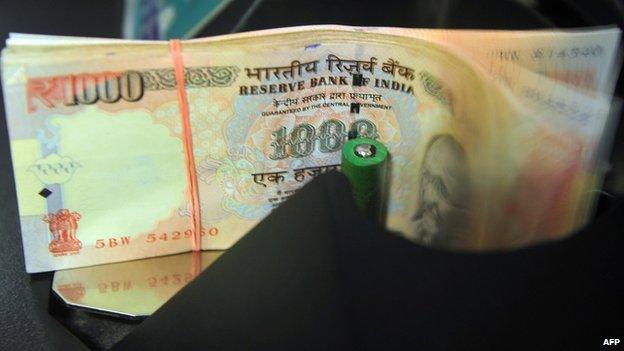Black money: Making a mountain out of a molehill?
- Published

Undeclared cash is seen as a major hurdle to India's economic growth
"Black money is so much a part of our white economy, a tumour in the centre of the brain - try to remove it and you kill the patient," wrote Indian-born writer Rohinton Mistry in his novel Family Matters.
To put it simply, black money is cash that has not been declared or taxed. It also fuels India's bustling underground economy. Politicians are believed to use it to finance expensive election campaigns. Buyers and sellers vastly prefer it in transactions involving land and property . It is near-impossible, for example, to buy both in the capital, Delhi, without paying a substantial amount of the price in funny money. Since the majority of India's jobs are in the informal sector, undeclared cash transactions are common. Essentially, black money rewards the dishonest and punishes the honest.
There are varying estimates, external about the amount of this illicit money stashed abroad - from $500bn (£297bn) to $2 trillion.
Dev Kar, chief economist at Global Financial Integrity, estimates India lost $213bn (£132bn) in illicit financial flows, external - or illegal capital flight - between 1948 and 2008 alone. He says this illegal capital was the result of graft, bribery and kickbacks, criminal activities, and tax evasion and accounted for 16% of the India's GDP. Arun Kumar, author of The Black Economy in India and economics professor, estimates the figure is much higher at $2 trillion. If the authorities are able to recover a fraction of this amount, it could fetch the government billions of dollars in revenue in taxes and penalties.
After coming to power, Prime Minister Narendra Modi vowed to crack down on people who had not reported money parked in offshore tax havens. So when the new government disclosed the names of seven people and a company on Monday for allegedly stashing away black money in foreign banks, many wondered whether it was making a mountain out of the molehill, external.
Among those named are a bullion trader, an industrialist and a mining baron. None of them are "big" names. Many believe that the government should "stop playing black money politics , externaland end the ongoing charade of disclosing names" as none of the lists appear to implicate any politician or a leading businessman. Now, an exasperated Supreme Court has ordered the government , externalto disclose all the names.
Also, should the war against black money not begin at home? Many believe that a lot of illegal money abroad may have returned to India, external through gold imports and investments in the domestic stock market.
India possibly needs to clean up its opaque political funding and the shadowy and corruption-ridden real estate market more urgently than going after illicit money abroad.